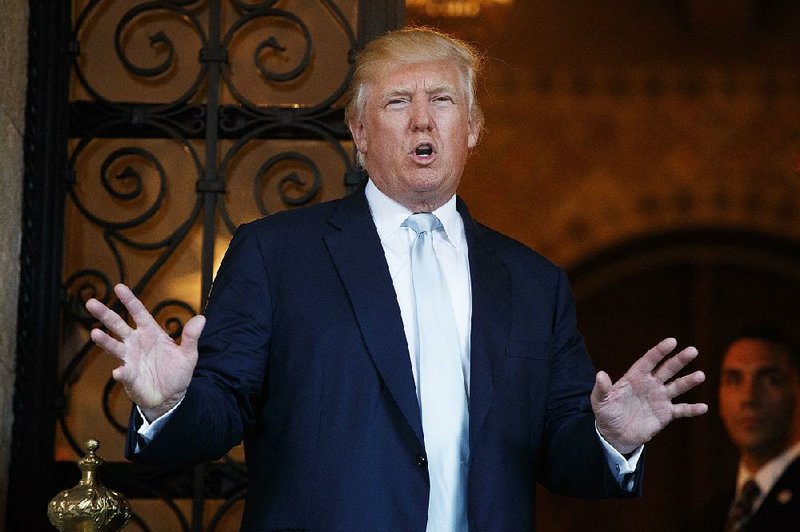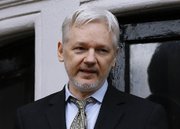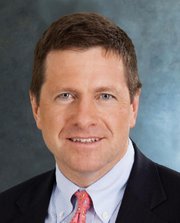WASHINGTON -- President-elect Donald Trump, challenging the work of U.S. intelligence agencies he soon will oversee, appeared to embrace WikiLeaks founder Julian Assange's contention that Russia did not provide WikiLeaks with the hacked Democratic emails that roiled the 2016 election.
RELATED ARTICLES
http://www.arkansas…">California hires ex-AG Holder to lead legal battles with U.S. http://www.arkansas…">Tillerson to get $180M package
Writing Wednesday on Twitter, Trump noted that Assange "said Russians did not give him the info" -- referring to the trove of emails stolen from the Democratic National Committee and John Podesta, a top aide to Democrat Hillary Clinton.
Trump's tweet puts pressure on intelligence officials to provide evidence of Russian election interference. A full report ordered by President Barack Obama last month is expected to be finalized by week's end. The Obama administration also plans to make an unclassified version public before the president leaves office Jan. 20.
Trump is to be briefed on the hacking report Friday by CIA Director John Brennan, FBI Director James Comey and Director of National Intelligence James Clapper. Brennan, in an interview Tuesday with PBS NewsHour, said the report will include "what was collected, what was disclosed and what the purpose and intent of that effort was."
[TRUMP: Timeline of president-elect’s career + list of appointments so far]
Trump, on Twitter on Tuesday night, said the intelligence briefing had been delayed from an earlier schedule, a development he called 'very strange!" He speculated that the reason for the delay was "perhaps more time to build a case."
Clapper is testifying on Capitol Hill today.
Vice President-elect Mike Pence commended Trump for his "very sincere and healthy American skepticism."
"Given some of the intelligence failures of recent years, the president-elect's made it clear to the American people that he's skeptical of conclusions from the bureaucracy, and I think the American people hear him loud and clear," Pence said after a meeting on Capitol Hill with Republican lawmakers.
House Speaker Paul Ryan initially declined to comment on Trump's Wednesday morning tweet, but when asked about it on The Hugh Hewitt Show, the Wisconsin Republican called Assange a "sycophant for Russia."
Leading Democrats were quick Tuesday night to criticize Trump.
When Senate Minority Leader Charles Schumer, D-N.Y., was shown during a television interview a copy of Trump's Tuesday night tweet, he said Trump was "being really dumb."
"Let me tell you, you take on the intelligence community, they have six ways from Sunday at getting back at you," Schumer said on MSNBC's The Rachel Maddow Show. "So even for a practical, supposedly hard-nosed businessman, he's being really dumb to do this. ... From what I am told, they are very upset with how he has treated them and talked about them."
Meanwhile, Sen. Mark Warner, Va., the ranking Democrat on the Senate Intelligence Committee, took to Twitter, saying he wished Trump showed "more ... respect for our intelligence professionals."
Limited information
According to the intelligence agencies' assessment, Russia not only meddled in the election, but did so to help Trump win. But the administration has so far released only limited information to support that conclusion.
Trump's views put him at odds with Obama and leaders in his own party who see Russia as a growing threat. And they put him in line with Russian President Vladimir Putin and Assange, whose organization has been under criminal investigation for its role in leaking classified information. Since 2012, Assange has been in the Ecuadorean Embassy in London, unable to leave without being arrested for breaching his bail conditions.
Indisputable evidence of responsibility for hacking is difficult to come by and often technical. The information the Obama administration has released so far does not lend itself to firm conclusions.
The most recent information has come from a joint analysis by the Homeland Security Department and the FBI that ties Russian government activities to the hacks of the Democratic National Committee and others. The analysis includes a list of Internet addresses identified by the administration as potentially tied to Russian hackers.
Many other addresses are untraceable. The Associated Press found at least 20 percent of the addresses had traced back to computer servers that help users browse the Web anonymously, often for legitimate purposes. That Web service, called Tor, was initially funded by the U.S. government and is now used prominently by activists and journalists working in hostile countries who need to keep their identities secret.
Other Internet addresses released by the Homeland Security Department trace back to servers at several U.S. universities, as well as tech giant Yahoo Inc. The government cautioned that the addresses weren't automatically tied to Russian malicious activity, but instead were indicators that computer security experts should investigate further.
Trump aides say that while he has received "raw data" on the Russian hacking, he is skeptical of the conclusions being drawn.
Steven Hall, a retired chief of Russia operations at the CIA, set expectations low for the public hacking report, saying agencies typically lean toward protecting intelligence-gathering techniques.
"The more information that is revealed, the more likely it is that sources and methods could be compromised, thereby limiting our ability to collect in the future," Hall said.
At the White House, spokesman Josh Earnest noted that all 17 U.S. intelligence agencies had agreed on the assessment about Russia's activities and added of Trump: "Who are you going to believe?"
"The decision he makes about that I think will have long-term consequences for the way he chooses to govern the country," Earnest said.
Indeed, Trump's challenges to the intelligence community since winning the election have been striking. The nature of the presidency gives the commander in chief discretion to decide how to respond to intelligence assessments. But any skepticism about the agencies' conclusions usually plays out privately in the Situation Room and Oval Office, not on Twitter.
Trump's posture has appeared to be driven in part by concern that evidence of Russian meddling would raise questions about the legitimacy of his election.
Sen. Lindsey Graham, R-S.C., one of his party's fiercest Russia critics, said the issue was not about the validity of the election, but "the fact that a foreign entity hacked into a political party."
"When you compromise one political party, you compromise all political parties," Graham said.
Wall Street lawyer picked
The fresh clash came as Trump took further steps to fill his Cabinet and key White House positions, with his attention shifting toward the challenges of governing.
He announced that he wants Wall Street lawyer Jay Clayton to be chairman of the Securities and Exchange Commission, saying in a statement that his pick is "a highly talented expert on many aspects of financial and regulatory law."
"He will ensure our financial institutions can thrive and create jobs while playing by the rules at the same time," the statement said. "We need to undo many regulations which have stifled investment in American businesses, and restore oversight of the financial industry in a way that does not harm American workers."
Trump has said he wants to undo many regulations that he says have "stifled investment" in American businesses.
Clayton, in a statement, said that he would work "with key stakeholders in the financial system to make sure we provide investors and our companies with the confidence to invest together in America. We will carefully monitor our financial sector, as we set policy that encourages American companies to do what they do best: create jobs."
Clayton is the latest Trump pick with deep ties to Wall Street -- having represented Goldman Sachs Group Inc. and Barclays Capital Inc.
The nomination immediately drew rebukes from groups that have been critical of Trump's track record of nominating Wall Street insiders for high-level positions, despite being critical of the industry during the presidential campaign. Trump has nominated Steven Mnuchin, a 17-year veteran of Goldman Sachs, to be Treasury secretary, and Stephen Bannon, Trump's chief strategist, worked on mergers and acquisition deals for the bank. Last month, Trump said he would appoint Gary Cohn, Goldman Sachs' president and chief operating officer, to lead the powerful National Economic Council.
"Trump supporters did not vote to let the fox guard the henhouse on Wall Street," Adam Green, co-founder for the Progressive Change Campaign Committee, said in a statement. Rep. Maxine Waters, D-Calif., a member of the House Financial Services Committee, said, "This nomination of a Wall Street insider to regulate Wall Street proves that Donald Trump has no intention of getting tough on Wall Street."
If confirmed by the Senate, Clayton would replace Mary Jo White, who announced shortly after the election that she will step down.
During her term, the SEC has been a central player of the Obama administration's effort to rein in big banks after the 2008 financial crisis and prevent future taxpayer bailouts of the industry. The agency has pushed for more oversight of hedge funds and other asset managers and has established rules that make it more difficult for big banks to make risky bets on the markets.
"The nomination of Mr. Clayton to head the SEC underscores the shift away from enforcement," Isaac Boltansky of Compass Point Research & Trading said in a research note Wednesday.
On Capitol Hill, meanwhile, Pence told Republicans that Trump has signaled that "it's time to get to work" and plans for his inaugural parade to be shorter than the usual 90 minutes and then to go straight to the Oval Office to begin signing executive orders repealing some of Obama's actions. Pence did not specify the topics of the potential executive orders.
Pence, who was greeted by applause as he entered the House GOP meeting with Reince Priebus, Kellyanne Conway and several other future White House aides, made clear that Trump intended to embark on an aggressive campaign to reverse executive actions taken by Obama starting on the first day of his presidency.
But members who attended the session said Pence offered few specifics on the pace or policies of these repeal efforts.
"They didn't enumerate a list, just that which came by the pen can die by the pen," said Rep. Mark Sanford, R-S.C.
Several members said they expect Pence will be the main point of contact between Congress and the White House and will spend a significant amount of time on Capitol Hill. Pence told members that he hopes to have an office on the House side of the Capitol in addition to the workspace provided to him as president of the Senate.
Information for this article was contributed by Tami Abdollah, Jack Gillum, Laurie Kellman, Deb Riechmann, Josh Lederman, Julie Pace, Eileen Sullivan, Julie Bykowicz, Erica Werner and Deb Riechmann of The Associated Press; by John Wagner, Greg Miller and Renae Merle of The Washington Post; and by Lindsey McPherson of CQ-Roll Call.
A Section on 01/05/2017


